1834-1892
Ordination and Religious Titles
Sword and Trowel Volume 4, 1874 pages 111-117 - see here
"Whence comes the whole paraphernalia of ordination as observed among some Dissenters? Since there is no special gift to bestow, why in any case the laying on of empty hands? Since we cannot pretend that mystic succession so vaunted by Ritualists, why are men styled "regularly ordained ministers"? A man who has preached for years is Mr. Brown, but after his ordination or recognition he develops into the Reverend Mr. Brown; what important change has he undergone? This comes before us in the form of addresses upon letters "Reverend Titus Smith, Mr. Spurgeon's College," or sometimes, "Reverend Timothy Jones, Spurgeon's Tabernacle." Rather odd, this! Here are reverend students of an unreverend preacher, the title being given to the one out of courtesy, and withheld from the other for the same reason. The Reverend Titus has met with a church which will insist upon an ordination, and he is ordained; but the President of his College, having never undergone such a process, nor even that imitation of it called a recognition, remains an unordained, unrecognized person to this day, and has not yet discovered the peculiar loss which he has sustained. We do not object to a recognition of the choice of the church by its neighbors and their ministers, on the contrary, we believe it to be a fraternal act, sanctioned by the very spirit of Christianity; but where it is supposed to be essential, is regarded as a ceremony, and is thought to be the crowning feature of the settlement, we demur."
Good questions!
Continued Spurgeon:
""The Reverend Theophilus Robinson offered up the ordination prayer" has a Babylonish sound in our ears, and it is not much improved when it takes the form of "the recognition prayer." Is there, then, a ritual? Are we as much bound by an unwritten extempore liturgy as others by the Common Prayer? Must there always be "usual questions"? And why "usual"? Is there some legendary rule for the address to the church and the address to the pastor? Mark well, that we do not object to any one of these things, but we do question the propriety of stereotyping them, and speaking of the whole affair as if it were a matter to be gone about according to a certain pattern seen in the holy mount, or an order given forth in trust to the saints. We see germs of evil in the usual parlance, and therefore meet it with a Quo Warranto? Is not the divine call the real ordination to preach, and the call of the church the only ordination to the pastorate?` The church is competent under the guidance or the Holy Spirit her own work, and if she calls in her sister churches, let her tell them what she has done, in such terms that they will never infer that they are called upon to complete the work. The ordination prayer should be prayed in the church meeting, and there and then the work should be done; for other churches to recognize the act is well and fitting, but not if it be viewed as needful to the completion of the act itself. We have noticed many signs of an error in this direction."
Amen to that!
Continued Spurgeon:
"The small matter which we have mentioned leads on to another which is by no means small, namely, the notion in some churches that only an ordained or recognized minister should preside at the Lord's table. Small is our patience with this unmitigated Popery, and yet it is by no means uncommon. Pulpits which are most efficiently supplied on other Sundays by men who are without pastoral charge must be vacated by them on the first Sunday of the month because the friends like a stated minister to administer the sacrament. This may not always be the language employed, but it often is and it is an unsanctified jargon, revealing the influence of priestcraft. Whence comes it? By what scripture can it be justified? "Breaking bread from house to house" does not read very like it. We suppose that the idea of a deacon leading the communion would horrify a great many, but why? If the church should request a venerable brother to conduct the service, a brother of eminent grace and prayerfulness, would the ordinance be any the less instructive or consoling because he was not in the ministry? Naturally enough the pastor, when there is one, leads the way by the respectful consent of all; but would fellowship with Jesus be more difficult, if he were out of the way, and an elder or deacon occupied his place? Our experience has never led us to bemoan, on the account of our people, that the communion was a maimed rite when a beloved deacon or elder has filled our chair. We love to have our brethren sitting with us at the table, breaking the bread as much as we do, and giving thanks aloud as we do, because we hope that by this visible sign men will see that "one is our Master, even Christ, and all we are brethren." Are we the less respected by our church officers for this? Do they take upon themselves lordly airs? Far from it. A more beloved and loving set of men never surrounded a pastor. We magnify our office in the best manner when we do not magnify it beyond the teaching of the Lord."
These are my sentiments fully. I was "ordained" twice by two separate Hardshell "presbyteries." As I have studied this subject over the years I have seen how the whole practice of Baptist having presbyteries being the "ordaining" body smacks too much of both popery and Presbyterianism.
More to come. Spurgeon's words on this issue are a good introduction.

No comments:
Post a Comment